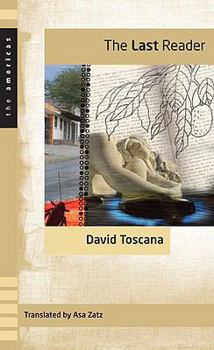The Last Reader
In tiny Icamole, almost deserted village in Mexico's desert north, the librarian, Lucio, is also the village's only reader. Though it has not rained for a year in Icamole, when Lucio's son Remigio draws the body of a thirteen-year-old girl from his well, floodgates open on dark possibility. Strangely enamored of the dead girl's beauty and fearing implication, Remigio turns desperately to his father. Persuading his son to bury the body, Lucio baptizes the girl Babette, after the heroine of a favorite novel. Is Lucio the keeper of too many stories? As police begin to investigate, has he lost his footing? Or do revelation and resolution lie with other characters and plots from his library? Toscana displays brilliant mastery of the novel--in all its elements--as Lucio keeps every last reader guessing.Praise for David Toscana's earlier work"Deserves to join the ranks of the great Latin American authors Gabriel Garcia Marquez and Jorge Amado" --New York Times Book Review"Introduces American readers to a gifted writer who seems poised to inherit the postmodernist mantle of Carlos Fuentes." --Kirkus Reviews
Format:Hardcover
Language:English
ISBN:0896726649
ISBN13:9780896726642
Release Date:October 2009
Publisher:Texas Tech University Press
Length:188 Pages
Weight:0.80 lbs.
Dimensions:0.8" x 6.7" x 9.4"
Customer Reviews
1 rating
Garcia Marquez meets Miguel Cervantes
Published by Thriftbooks.com User , 14 years ago
"Nobody else shared his interest... by the time opening day of the library came, the people were full of arguments against books: books are concerned with things that don't exist, they are lies. If I put my hands near the fire, one man said, I get burned; if I stick myself with a knife, I bleed; if I drink tequila, I get drunk; but a book does nothing to me unless you throw it in my face. Others laughed at this sally, and the matter was settled." - from The Last Reader In the tiny village of Icamole, Mexico it hasn't rained for a year. The locals do their best to scratch out a living, relying on water delivery from a nearby town located on a mountain ridge that seems to always stop rain from reaching Icamole. Life there is understandably difficult. When a beautiful young girl from a nearby village is found murdered in the bottom of a young man's well he is mystified, not just at how she got there, but also by her perfect beauty. Remigio, who owns the land, is the son of Lucio the town librarian. After he retrieves the body and lays it out in a more dignified manner, he hurries to town to ask his father what to do. Lucio, who like Don Quixote, lives his life through the books he reads, immediately refers to this young girl as Babette, comparing her to a similar character in a book he's read. He tells his son to bury her beneath his avocado tree, letting her body become one with the roots. It's a romantic notion he picked up from one of his favorite novels. Lucio, working unpaid in a position that doesn't officially exist anymore (the officials had stopped paying him months ago), is the town's sole reader, working his way through boxes of books still arriving from who knows where. If one tiny thing about a book offends him in any way he shoves it into a hole in a door to a dark, closed up room, where, he assumes, bugs will consume the useless, unwanted books. If he loves a book, it goes on a shelf. Day after day he opens the library. And day after day no one comes for a book. "Burning seems to him an inappropriate form of punishment, for it confers upon an inane book the utility of producing heat, the distinction of being converted into light. Hell must be that which consumes slowly, between urinations and mandibles that tenaciously disintegrate book covers, dust jackets, authors' and authoresses' photographs with the intellectual pose of the former and the wishful beauty of the latter. The bugs have to regurgitate prizes, recognitions, and, particularly, bogus praise singling out each book as a consummate model of prose style..." The police, portrayed as somewhat bumbling, but somewhat threatening, come to Icamole in their investigation into the girl's disappearance. The town braces itself, worried who in this tiny village could possibly have done what the police presume happened, murdering this beautiful young girl. And Remigio continues to tend the avocado tree, petrified the dirt beneath it will look disturbed, standing out from the





